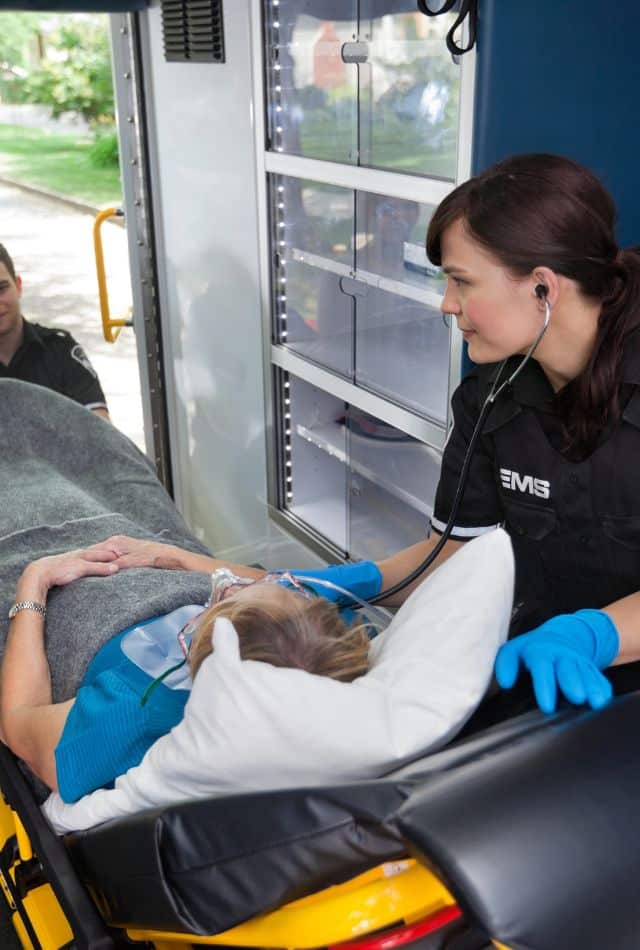What is Medical Transportation – Overview
Several medical transportation services are available today to transfer patients between healthcare facilities and save lives in an emergency. Medical transportation services are available round-the-clock, every day of the week, including public holidays.
The specific type of medical transportation a patient needs will depend on the severity of the situation, the mileage, and the patient’s medical condition.
What are the Benefits of Medical Transportation
Medical transportation services help patients to reach their destinations efficiently and quickly. During transit, highly trained drivers, EMTs, and paramedics are on board to provide any emergency medical assistance the patient may need to ensure a safe arrival at the destination.
Medical transportation for non-emergency cases can be scheduled in advance to transfer a patient to and from appointments at hospitals and other healthcare facilities. Healthcare providers recommend the appropriate level of medical transportation—emergency or non-emergency—based on the patient’s condition and needs.
What are the Different Types of Medical Transportation

Medical transportation is divided into two main types – Non-Emergency and Emergency medical transport services.
1. Non-Emergency Medical Transportation
Non-emergency medical transportation is a professional service that transports patients with an injury or health condition that is not an immediate threat to their life. For example, doctors can schedule non-emergency medical transport for patients with a medical condition that does not allow them to travel normally.
Law firms use non-emergency medical transportation services to transfer injured clients to interviews, court appearances, or depositions.
Here are some of the most popular types of non-emergency medical transportation services available in the United States:
Ambulatory Transportation (Sedan)
Ambulatory transportation is the most common type of non-emergency medical transportation. It is meant for patients who do not need special assistance to travel and can walk around without needing more than basic assistance.
Stretcher
A stretcher medical transport service is specifically for patients who cannot sit upright due to their medical condition, including but not limited to back conditions. This medical transportation service is non-emergency and indicates that the patient does not require assistance in transit or travel time.
Wheelchair
Wheelchair transport services are meant for those individuals confined to a wheelchair or who cannot walk independently without significant assistance. These services are operated by highly-skilled CPR-trained drivers who operate the van and wheelchair lifts.
Wheelchair transportation services often provide or accommodate wheelchairs, ensuring patients with disabilities receive the necessary support and consideration. Besides, using a wheelchair medical transportation service indicates that the patient does not require emergency medical care at the time of service.
Flight Escorts
Medical flight escort services are aimed at patients who are strong enough to travel by air but still need medical supervision as they cannot communicate effectively or sit upright. Opting for medical flight escort services is appropriate for patients who do not require extensive medical equipment or immediate care provided by a private air ambulance.
For this, the service providers arrange flight escorts with a commercial airline. An onboard nurse accompanies the patient and monitors their health throughout the flight.
On arrival at the destination, the nurse caretaker coordinates with ground transportation, such as medical transportation, taxi or the patient’s family members, to get the patient to the designated destination.
Courier Service
Medical courier service is available for hire. This service transports biological matter, such as human blood and organs, to hospitals and research facilities. Drivers of medical courier services receive specialized training and thorough screening to ensure the safe and compliant transport of biological materials. They also adhere to the strictest confidentiality and privacy standards, including HIPAA.
2. Emergency Medical Transportation
Emergency medical transportation involves transporting patients suffering from life-threatening injuries or health conditions to and from hospitals, homes, and other healthcare/screening facilities. There are several different types of emergency medical transportation services available, including:
Basic Life Support (BLS) Ambulance
A Basic Life Support (BLS) ambulance transports patients who need noninvasive medical assistance, such as oxygen therapy or monitoring. It has experienced EMTs on board who provide EpiPens, bandages, splints, oxygen tanks, cardiac monitoring units, and other medical supplies, if required, during transit.
A transportation representative usually coordinates BLS ambulance transportation before the patient is discharged so they can be transferred to their home or other medical facilities, such as a rehabilitation clinic, assisted living community or psychiatric healthcare facility.
Advanced Life Support (ALS) Ambulance
Similarly, Advanced Life Support (ALS) ambulance services are operated by highly-trained paramedics. Advanced Life Support (ALS) ambulances are staffed by paramedics who are trained to provide advanced medical interventions, such as administering intravenous medications, performing advanced airway management, and monitoring complex vital signs during transport.
Conclusion
Non-emergency and emergency medical transportation services play a vital role in ensuring the safe transfer of patients to and from hospitals, homes, and clinics.
These services are extremely useful when patients need to be transferred home after their discharge date or to another healthcare facility for screening or treatment.
See Also
Medical Insurance for Senior Citizens
Most Popular Medication for High Blood Pressure
Free Home Repair for Senior Citizens
Free Government Money for Seniors Over 50